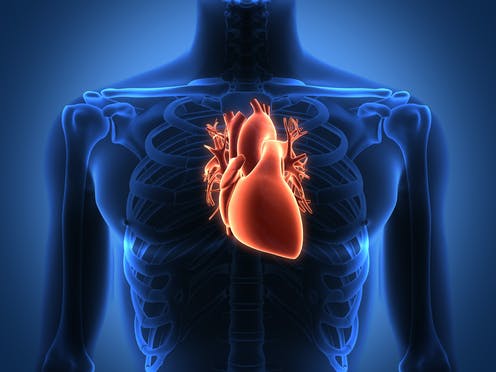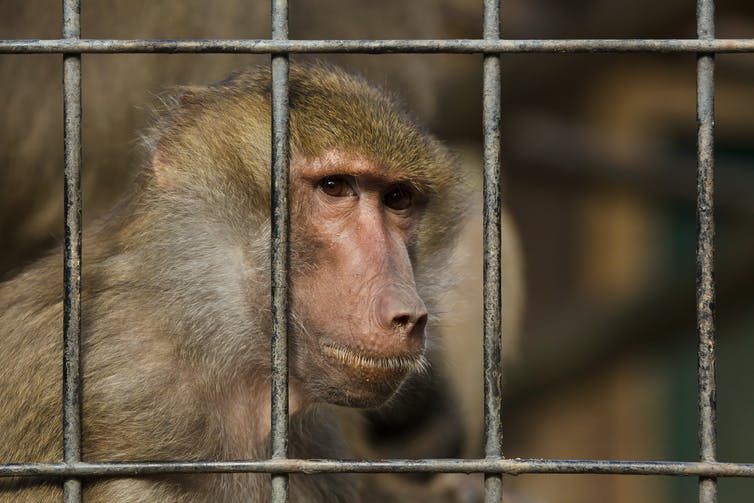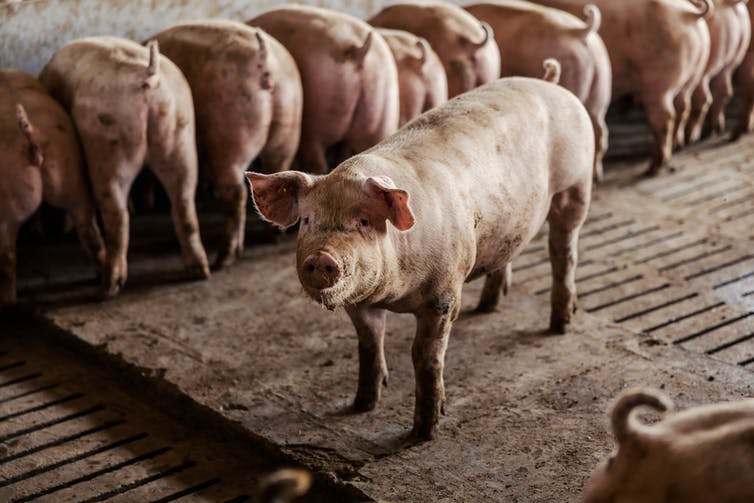
At the end of 2021, 57-year old David Bennett Sr. was bedridden and on life-support with irreversible heart failure. He was not eligible for a human heart transplant or an implanted mechanical heart pump because of his underlying health condition and, allegedly, “a history of disregarding medical advice.”
Certain death was on the horizon and this fatal prognosis made Bennett a candidate for a highly experimental and never-before-attempted surgical procedure involving the transplantation of a heart from a genetically modified pig.
Read more:
Pig heart transplant: was David Bennett the right person to receive groundbreaking surgery?
The pig-to-human cardiac transplant — or xenotransplant — was authorized by the U.S. Food and Drug Administration on compassionate grounds on New Year’s Eve 2021 and the surgery was performed on Jan. 7, 2022.
Initial reports following the experimental surgery suggested that the genetically modified, human-compatible pig heart was functioning well and infection was not a problem.
Bennett died on March 8 — at the time, “no obvious cause” of death was identified. Now, it has been reported that the pig heart was infected with a virus called porcine cytomegalovirus and that this virus may have contributed to Bennett’s death.
Though the cause of death remains unclear, infection has been implicated in previous xenotransplantation failures involving baboons as the recipients.
Table of Contents
More demand than supply
There is an ongoing chronic shortage of suitable human organs for life-saving transplantation. Indeed, many Canadian transplant candidates die waiting for an organ donation.
Attempts to increase the limited supply of human organs have included changes to consent rules: moving to an opt-out system, introducing directed living donation and deceased donor-initiated chains and, in some countries, offering financial compensation.
Still, patients die on transplant waiting lists. For this reason, there is ever increasing interest in xenotransplantation — an ethically controversial practice.
Nonhuman primates and pigs
In 1984, the heart of a young baboon was transplanted into Baby Fae, an infant born with a fatal heart defect called hypoplastic left heart syndrome. Baby Fae lived for three weeks, but eventually died of heart failure caused by rejection of the transplanted baboon heart.
Prior to this, there had been three other experimental nonhuman heart transplants, the earliest in 1964 using a chimpanzee heart.
More recent efforts at xenotransplantation have involved the transplantation of pig kidneys into brain-dead humans. The most dramatic recent example, however, remains Bennett’s first-in-human cardiac xenotransplant using a genetically modified pig heart.

(Shutterstock)
For some, the use of pig hearts for xenotransplantation may be ethically preferable to the use of nonhuman primate hearts because pigs are already used for medicine: for example, pig heart valves, corneas and skin are used in various treatments.
Or it could be that pigs are preferable “organ donors” because they are already used for food. When it comes to food animals — those who are consumed by humans — people can be biased against accurately seeing the subjectivity of the animal. This is referred to as the “meat paradox,” where people perceive food animals as “objects and thereby avoid the discomfort caused by knowing about the suffering behind consumer goods.”
A third reason to prefer killing pigs for human benefit instead of killing nonhuman primates is that pigs are biologically less similar to humans.
Prioritizing humans
Moral worth — the value assigned to others in ways that affect how we treat them — is not species specific. Rather, it is associated with specific capacities such as the ability to think, make choices, experience pain, communicate and have social relationships.
Because a human zygote lacks such capacities, not many believe that they have the same moral worth as a human two-year old, and there is nothing obviously irrational about this belief. Though a zygote may have the potential to reach a comparable level of development as a two-year old, they are not yet comparable. Their shared human identity is beside the point.
On occasion, humans may choose to prioritize the interests of their companion animals without doing something obviously wrong. For example, it is not irrational to spend money on the care of pets, even if that money could have gone towards helping fellow humans. This choice may reflect a shared social relationship and the emotional bonds that come with it. It may also reflect a sense of duty toward nonhuman animals that are dependent on the care provided by humans.
Having said this, clearly, there are times when it is appropriate to prioritize the interests of humans over other animals; it is just that this perspective shouldn’t be the default position. In any case, it is not clear, nor is it easy to determine, that Bennett’s extraordinary xenotransplant falls into this category.

(Shutterstock)
Animal welfare
In Canada, support for animal-based research is anchored in a commitment to prevent — or at the very least reduce — unnecessary suffering. The problem with this stance is that current animal welfare considerations do not typically support strong constraints on the scientific use of animals.
Notably, there are pressures to limit, but not to eliminate, the use of animals in research likely to have severe welfare impacts. Also, common animal welfare considerations do not prohibit killing the animals, they just constrain how they are killed.
Part of the problem here is that there are no substantive ethical principles governing animal use in science. The three Rs, which are pervasive in regulated animal use in science, emphasize replacing sentient animals (animals capable of experiencing pain and pleasure) where possible, reducing the number of sentient animals used in studies to a “bare minimum” and refining their experiences of use to minimize suffering.
As such, the three Rs seem to assume something like a principled commitment to non-maleficence — avoiding unnecessary harm. However, the continued dependency on harmful animal-based research that almost always ends with the killing of the animals belies this claim, given the known significant problems of extrapolation of research findings.
Given the ethical challenges with animal-based research in general and more specifically the ethical challenges with animal-to-human xenotransplantation, there is good reason to look for other strategies to increase the supply of organs for transplantation.
![]()
Andrew Fenton is a member of the (Canadian) Society for Humane Science and is currently serving on a subcommittee for the Canadian Council on Animal Care (revising their core ethics document) and a panel on nonhuman primate research for the National Anti-Vivisection Society.
Françoise Baylis does not work for, consult, own shares in or receive funding from any company or organization that would benefit from this article, and has disclosed no relevant affiliations beyond their academic appointment.
























